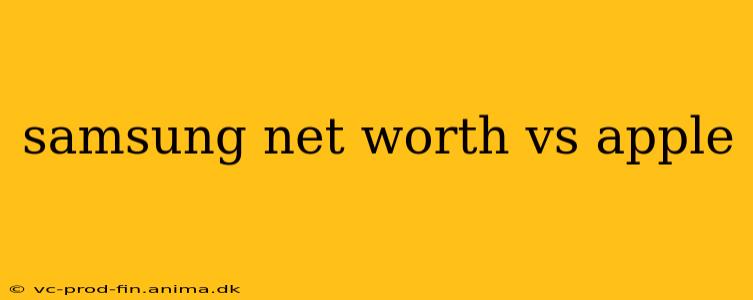The rivalry between Samsung and Apple is legendary, a constant battle for market share and technological supremacy. But how do these two tech giants stack up financially? A simple comparison of their net worth isn't straightforward, as "net worth" can be interpreted in several ways. We'll delve into the key financial metrics to paint a clear picture of their relative financial strength.
What is Net Worth? Understanding the Nuances
Before diving into the comparison, it's crucial to understand that "net worth" for a publicly traded company like Samsung or Apple isn't a single, easily defined number. We're usually talking about market capitalization, which is the total value of all outstanding shares of stock. This fluctuates constantly based on stock prices. Other relevant metrics include assets, liabilities, and equity.
Market Capitalization: This is the most common way to compare the size of publicly traded companies. It's calculated by multiplying the current share price by the total number of outstanding shares. It reflects the market's overall perception of a company's value and future potential.
Assets, Liabilities, and Equity: A company's balance sheet shows its assets (what it owns), liabilities (what it owes), and equity (the difference between assets and liabilities). Equity represents the net worth of the company from an accounting perspective.
Samsung's Financial Landscape
Samsung, a South Korean multinational conglomerate, operates across diverse sectors, including electronics, shipbuilding, construction, and finance. Its electronics division, encompassing smartphones, home appliances, and semiconductors, is its most prominent and profitable segment. While its market capitalization often trails Apple's, Samsung boasts significant assets across its various business units, resulting in a substantial overall net worth (considering total assets minus total liabilities). Analyzing Samsung's financial performance requires looking beyond just its market cap to understand its diversified strength and resilience.
Apple's Financial Dominance
Apple, the American multinational technology company, is synonymous with premium consumer electronics and a powerful brand ecosystem. Its market capitalization consistently ranks among the highest globally, primarily driven by its iPhone sales, services revenue (like Apple Music and iCloud), and a loyal customer base. Apple’s financial success stems from its highly profitable product line and its ability to create a seamless user experience, leading to high customer retention and loyalty.
Samsung Net Worth vs. Apple Market Cap: A Direct Comparison (as of [Insert Date])
A direct comparison requires specifying the date, as market capitalization changes constantly. [Insert current Market Cap for Apple and Samsung from reputable sources like Google Finance or Yahoo Finance]. As you can see, [State which company has a higher market cap and by how much (percentage or absolute value)].
It's important to remember that market cap is just one metric. While Apple often boasts a higher market capitalization, Samsung’s diversified portfolio and substantial assets give it considerable overall financial strength.
Frequently Asked Questions
How does Samsung's profitability compare to Apple's?
Both companies are highly profitable, but Apple generally boasts higher profit margins due to its premium pricing strategy and strong brand loyalty. Samsung's diverse business portfolio, while offering resilience, sometimes results in lower overall profit margins compared to Apple's more focused approach.
Which company has more cash reserves?
Apple is known for having significantly larger cash reserves than Samsung. This reflects its consistently high profitability and efficient management of its finances.
Which company is more innovative?
Both companies are known for innovation, but their approaches differ. Apple focuses on creating a seamless ecosystem and user experience, while Samsung often incorporates cutting-edge technologies across a wider range of products. Determining which is "more" innovative is subjective and depends on the specific criteria used.
What are the major risks facing each company?
Both companies face risks like intense competition, supply chain disruptions, and changing consumer preferences. Apple's dependence on iPhone sales could be a vulnerability, while Samsung's diverse portfolio might expose it to risks across multiple sectors.
This analysis provides a comparative overview of Samsung and Apple's financial positions. Remember that financial markets are dynamic, and these figures are subject to change. Consulting up-to-date financial reports from reputable sources is crucial for the most accurate information.
